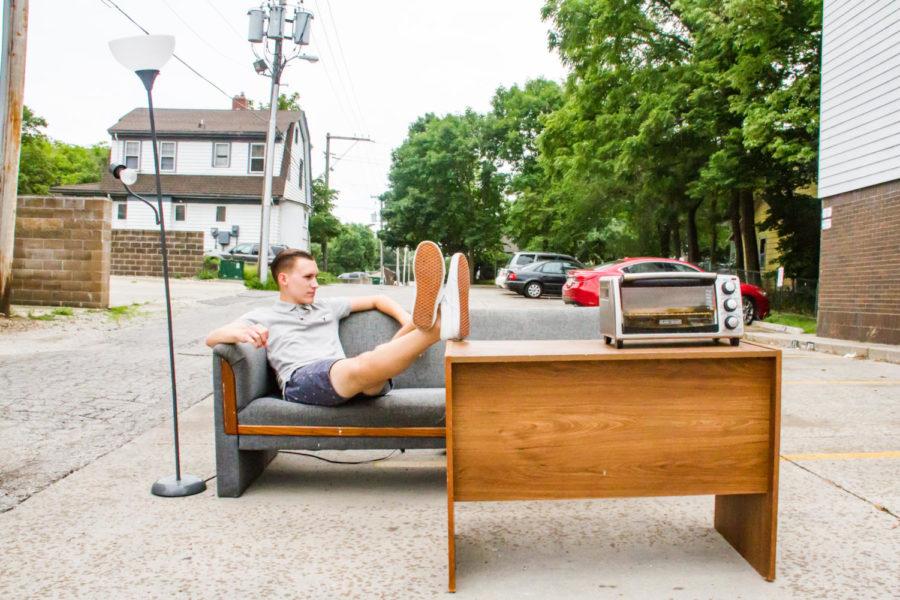Students discuss how to approach the lease gap in Ames
Students are left without a place to stay in between leases for the summer and fall.
August 15, 2019
As students are beginning to move into their apartments, some may be recovering from homelessness due to a leasing gap, a period between one lease’s end and the other’s beginning, during which students may not have a place to live.
Anna Hummel, a junior in English, said she and her boyfriend have been living in Ankeny for the last two weeks of July in their roommate’s parents’ house.
“Obviously it’s not the ideal living situation, but it could have been worse, such as having to stay in a hotel room,” Hummel said.
Hummel said it would be harder for international students to find a place to stay during a lease gap.
Preston Burris, co-chair of the Ames Tenants Union, also said the lease gap is organized. Burris had fallen through the lease gap this summer as well as 2018 and spent that time either living in an abandoned apartment or “couchsurfing.”
“This year I stayed at about four different places with four different friends,” Burris said. “One of my friends I stayed with for a couple nights lived in Campustown, and because there’s no overnight parking anywhere nearby I had to park at Hy-Vee — over a mile away — in order to just not get my car towed. I had no other options.”
The leasing gap has been an issue that has been brought up during City Council meetings by Devyn Leeson, ex officio student liason for Ames City Council. Leeson brought up nine housing-related issues in June, including the lease gap.
“Now the city can’t really do a whole lot about the lease gap issue because state law dictates that city ordinances can’t dictate what is in a lease or what is not in a lease,” Leeson said. “And so a lot of it has to come down to discussion between landlords and people representing students.”
Leeson said there is an issue with yearly leases as opposed to monthly leases, which puts students in a situation where they are homeless and describes it as a “market failure of capitalism at its very core.”
“The current power structure of landlords and tenants is structured in such a way that power is almost held entirely by the landlord, and they use that power to find ways they can get money,” Leeson said. “[…] [the leases are] specifically designed. That is not a mistake; it is something that landlords might say they care about, but if it was truly something they cared about, then it would be fixed by now, the market would have fixed it — landlords would have come together and say ‘hey we should offer different types of lease terms.’”
Both The Madison and First Property Management were reached out to for a landlord perspective, but neither had responded by time of publication.
Due to state laws, the local government cannot dictate private business issues. This was an issue after the council passed a rental cap — which limited properties from securing city rental permits in seven neighborhoods if the percentage of single-family homes and duplexes in those neighborhoods was already at 25% or more. However, Gov. Kim Reynolds signed a bill to ban city rental caps.
Due to this, the local government cannot legislate landlord decisions.
“I really think that [the lease gap] is something to be fixed on the state level. The problem is the landlords have a huge lobby on the state level that everybody basically just listens to and will follow,” Leeson said.
In efforts to push the lease gap to the state level, Burris and the Ames Tenants Union have worked with Iowa City, Dubuque and other cities’ tenants and renters unions to build their voice.
“We want to be able to start applying power to the states so we can actually start affecting a lot of these issues that we can’t affect at the local level,” Burris said. “Like rent caps being illegal and stuff like that, we would love to change that, but we can’t do that if we’re just acting in a very small city, and so we do have to build a statewide coalition for tenant rights and for the ability for local governments to actually legislate and to have power over landlords.”
In order to build a relationship between tenants and landlords, the director of residency for Student Government, Marte Broadnax, is working on bringing landlords to the residency fair to answer questions students may have. Broadnax said she wants to educate students about leasing contracts and the legal language.
“I definitely think more education, just on the formality of leasing and the language, as well as tenants’ rights … to talk to their landlords before signing on certain aspects such as lease gaps,” Broadnax said. “[…] Making tenants more aware and informed to hold a discussion about their rights.”
Currently, Iowa State offers temporary housing at Willow Hall for $25 per night for students falling into the leasing gap, according to its website.







